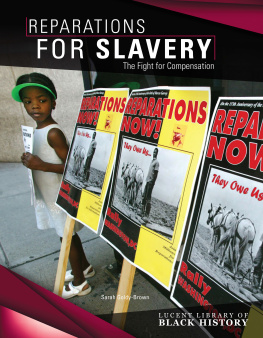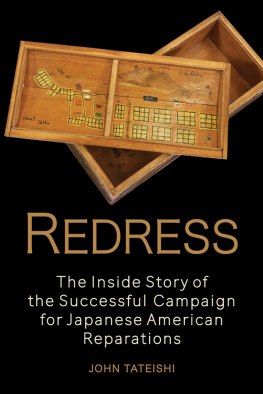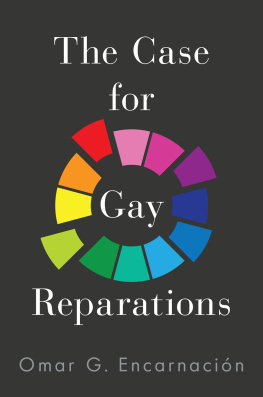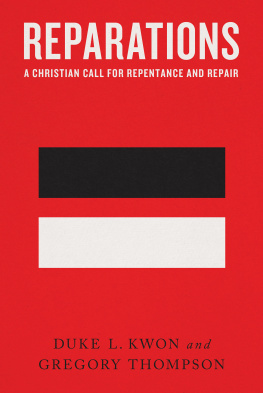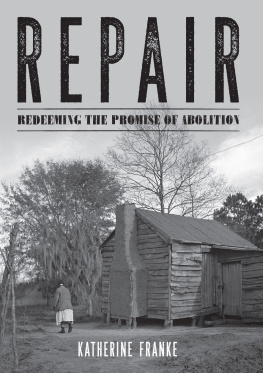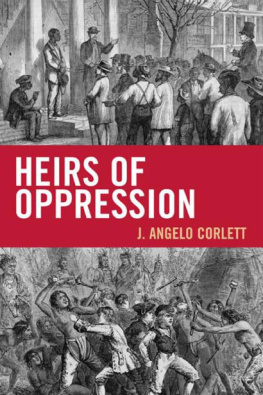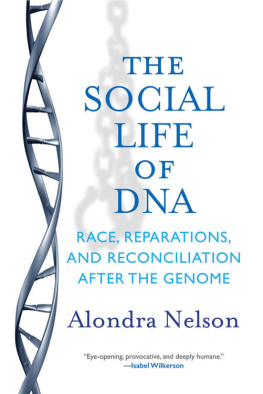To Africans both living and dead
who received no justice for being captured,
enslaved, colonized, and discriminated against.
Your struggles and sufferings
will never be forgotten.
W hen I was first approached to be a contributor for Should America Pay? I was unwilling. Not because I did not recognize the importance of the book but because I did. What finally convinced me was the opportunity to put down my thoughts and passions around this issue of justice for people of color. I was particularly passionate about the need to highlight the way in which issues of race and racism have tended to replace charity for justice when demands arise from people of color. This fact has been most strongly brought home to me in my participation since 2001 with the Jubilee movement and preparations for the World Conference Against Racism that took place in Durban, South Africa, in August 2001. For me both of these have been about opportunities for the world to look honestly at our economic and political history as a global community, and to change the system toward a more just one. However, it has become clear that there is real resistance to placing in a true historical context the present situation of so-called Third World people all over the world. The lengths to which Western governments have been willing to go to stop real discussions about both debt cancellation and reparations have been to me amazing and often heartbreaking. The resistance to the idea of even looking into or discussing responsibility for past atrocities and present inequities could be disheartening if it were not for the feet that it is equaled, and often surpassed, by the demands for justice that are beginning to be heard and litigated by historically oppressed groups from around the world. The honest discussion of reparations has come of age in the United States and the world. Maybe I should say that the world has come of age for the discussion of reparations. The truth is the discussion and claim for reparations from Africans and African descendants in the Maafa has been taking place since even before the Emancipation Proclamation. What has changed are not the demands from those due reparations but the realization by those in power that those demands will not simply go away if they are ignored.
In the last few years, the debate about reparations has moved steadily into the mainstream. The brave efforts of people like Congressman John Conyers (D-MI), who has introduced legislation calling for the study of the claim for reparations into every session since 1989, can no longer be regarded as quixotic. The Debt, the best-selling book by Randall Robinson, simply gave eloquent words and strong arguments to a sentiment that has been felt in the African American community for generations, and placed those arguments into the larger public forum. The very fact that right-wing commentator David Horowitz published Ten Reasons Why African Americans Should Not Be Paid Reparations speaks not to the weakness of the claim but to the need for the right to respond concretely to a legitimate demand. If there were no basis for the claim, there would be no need to attempt to repudiate it. Clearly the debate about reparations is now front and center on the United States and international public policy stage.
In fact the question that should be raised is not why has this happened now, but rather why has it taken so long? Why is it that the demands of African states for reparations from the colonial powers have been ignored for over forty years? Why is it that calls by African Americans for repayment for the years of unpaid labor as slaves and underpaid labor for generations and continuing to this day have been pushed aside? Part of the answer must be found in the worlds willingness to ignore demands for justice by people of color. Rather, it has been easier to offer charity, which maintains a system where people of color are seen as recipients of the largesse of the West rather than claimants to what is rightfully theirs. African nations are given loans by Western governments, banks, and international financial institutions, with no recognition that the wealth that allows the latter to make those loans is partly built on wealth removed from the former during slavery and colonialism. African Americans are offered affirmative action to help them overcome years of injustice. The problem with charity, whether it be loans and grants or affirmative action, is that it is reliant on the goodwill of the benefactor. When the charitable feelings end, as has clearly happened in the United States with regard to affirmative action, there is no incentive to continue to give until the wrongs committed have been righted. A demand for justice, on the other hand, is not based on the willingness of those paying to pay, but on the right of the recipients to be compensated for crimes against them.
The response to two movements with a growing momentum in 2001-2002 shows how far the West is willing to go to forestall the discussion of justice in regards to demands by people of color. The first is the Jubilee movement calling for debt cancellation for the worlds poorest countries. The initial response from the West and its international financial institutions was to talk about debt reduction. When this failed to stop the momentum, President Bush stepped in to suggest that the World Bank should offer grants to so-called Third World countries. However, the West is not the only one to realize that the momentum is growing, and these offers of continuing charity were swiftly denounced by organizations such as Jubilee South. The Jubilee South communiqu issued from Genoa in 2001 stated, We do not accept the concept of grants from the North to South, because what is due us is, in fact, reparations The fact that the West is unwilling to countenance even the discussion of compensatory remedies or the declaration of slavery to have been a crime against humanity indicates the level of anxiety that the demand for justice from people of color provokes.
We are told that these issues are in the past and we must focus on the present and the future, as though the past has no effect on either. We are told that it would be too difficult to find those who have been directly affected by slavery after such a passage of time. We are told that there is no one today who is directly responsible for slavery, that it was accepted practice at the time and that Africans sold other Africans into slavery. The authors in Should America Pay? more than adequately address the racial red herrings that are often the refuge of those resisting discussion on compensatory remedies. Such weak arguments are raised to convince the world that reparations cannot be seriously countenanced or even studied. All that these arguments prove is the way in which issues important to people of color in general and Africans and African descendants in particular are treated ahistorically. As though there were no similar claims made by others and accepted as legitimate by the very powers that denigrate the claim for reparations. For too long people of color have accepted the delegitimizing of their claims, little realizing that their unwillingness to press for justice would be used against them, such as the claim of the long passage of time.
Yet all the arguments against reparations are easily countered if the discussion is placed in context, historically and politically. The easiest question to answer is probably who should pay reparations. Those states that benefited from slavery and colonialism are clearly responsible. The fact that the responsibility of the state continues has been used against African states in the payment of debts accumulated by previous and illegitimate regimes. The clearest and most recent example is that of South Africa, where the majority government is now paying the debts for loans taken by the apartheid regime. The nationalist government of South Africa used many of the loans it received to bolster its ability to oppress black South Africans, yet today it is those who fought against apartheid who are called upon to repay those debts. If South Africans can be asked to pay for their oppression, how is it that Europeans and the United States cannot be asked to pay for the way in which their wealth was accumulated? It is a compelling argument that the felonious legacy of a nation outlasts the government under which crimes were committed against its citizens.


